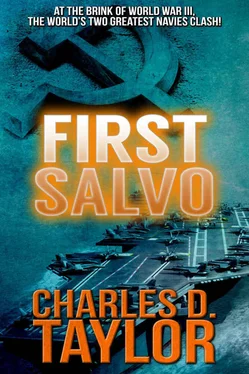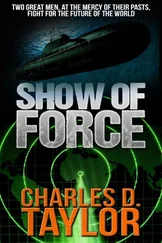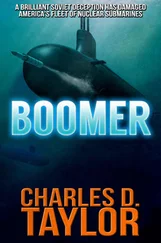Admiral Konstantin’s missiles were not quite the match for the Harpoons in Pratt’s battle group. As the Soviet force raced at flank speed to close the range, their ships took hits that gradually cut down their firepower. Fifteen minutes after the Americans opened fire, it was finally returned, but with little authority.
The unseen battle beneath the sea was uncompromising. To those on the surface, only sonar reports of underwater explosions and submarines breaking up gave evidence of its intensity. Nor would a soul below ever witness the weapons of his own destruction. For an instant, seconds at most, it would suddenly become apparent to each man that there was no longer a chance to outmaneuver the torpedo bearing in on his metal coffin. There would be an explosion and the submarine would careen downward. For those who survived the blast or the water that poured under tremendous pressure into shattered compartments, perhaps the lights would blink out one by one or the air would gradually fail. Then there would be the sound of the hull collapsing, eggshell brittle against the increasing pressure as the sub spiraled deeper, until there was nothing.
Few of these hunter-killers survived the day. In the confines of the Mediterranean, their presence was known and expected by their opposite numbers. They neutralized each other. Their fate would be noted only when they failed to report.
The concluding stage of the Battle of the Mediterranean was fought by the Americans in a unique way. Because it was an electronic war, the key to victory for NATO lay in the wizardry of Yorktown ’s AEGIS system. But Yorktown was dead in the water, immobilized so that her remaining electrical power was marshaled to run AEGIS. While she floated in the Mediterranean, moved only by the vagaries of the sea current, rolling with the gentle swells like a sailboat, she still controlled the entire battle for those ships that surged ahead of her to meet the Russian surface force.
Though Yorktown ’s sonar was inoperative, she received input from other ships, her computers recording the locations of those subs that still survived, assigning ships to prosecute those that threatened the group. Though she could not fire a missile in her own defense, she searched out and evaluated every threat still in the air, controlling the weapons of the ships that fired upon those threats; and though she could not place herself in the forefront of the battle, she protected her ships out front, bringing down the attacking missiles by controlling their weapons.
And of even greater note was the fact that the Admiral who controlled the battle defied tradition by remaining to the rear, choosing to stay with the undefended ship that was so critical to the success or failure of his mission. While generations of admirals had led their fleets into battle, accepting the inherent risks in the front of the battle line, Admiral Pratt took an even greater risk by remaining with that ship which would become the primary target.
Admiral Konstantin realized even before the first missiles were launched that he must get Yorktown at all costs. It was now his one remaining opportunity. He was unaware that the cruiser lay thirty miles astern of the attacking force, and he initially searched for his target amidst the oncoming ships. Perhaps that was what gave the Americans the edge — in a war of milliseconds, they gained minutes, minutes that allowed Yorktown to protect the battle group from the Soviet missile salvo.
Dave Pratt sat next to Carleton, studying the consoles before them. “For every missile we launch, they seem to have two or three,” he commented.
On the boards before them, they watched as the colored objects representing the opposing forces closed each other. Smaller symbols, representing missiles, appeared more brightly on the boards, moving rapidly, some merging with the large opposite-color symbols.
So involved were they that a few moments later Tom Carleton was certain he was responding immediately to Pratt’s last comment. The warning buzzer, indicating that a missile was locked on Yorktown , had just gone off. “And they seem to have finally located us. I think you’d better be prepared to shift to another ship.”
Yorktown could not defend herself from the approaching missiles. Though she could control the defense of a battle group, she was now as helpless as a baby. The ship could only track the approaching missiles, waiting impotently for the impact. The first missile buried itself in Yorktown ’s bow, rekindling fires that had finally been controlled. A second landed amidships, plunging into the engineering spaces before it burst.
Once again lights flickered in CIC. The unnoticed hum of cooling motors in the electronic gear suddenly took on a new meaning as the men became aware of man-made equipment struggling, then faltering as the power dropped.
Carleton punched the button for the chief engineer. Again and again, he called. There was no answer. He contacted the executive officer on the bridge and was told that they too were out of touch with both engineering and damage control. He turned to Pratt. “That’s it, I think.” The burst of another missile interrupted him. The lights flickered, then went out. There was dead silence in CIC. Battle lanterns pierced the heavy air. No longer would Yorktown coordinate the battle group.
Seconds later there was a tremendous explosion directly above them. Shelves and equipment broke away. Though there were no flames, there was the smell of dust and smoke in the air. A voice came over the IC in front of Carleton. “The bridge is gone. They—” Then it too broke off.
“Come on, Dave,” Carleton said, jumping to his feet. “Let’s get you the hell out while there’s still a chance.”
A sailor yanked open one of the hatches leading to the bridge.
Flames licked hungrily in at them. The door was wedged shut. “Back here,” Carleton said, taking Pratt’s arm. “We’ll cut out the back way.”
When the hatch was pushed open, they were greeted with thick black smoke. The crackling of flames mixed with the cries of the wounded and the shouted orders of the damage-control parties. All combined to create a raucous sound that was both confusing and terrifying. It was heightened by the gruesome sights that greeted them as they raced down the ladders to the main deck.
Behind and above them, the bridge area was a mass of twisted metal. Searing flames rose above the masts. Occasional drafts of wind revealed only torn, twisted metal where Yorktown ’s bow had once parted the waves. They were forced aft by wind-driven flames, only to be stopped by a fresh conflagration from a jagged hole in the main deck. Parties of sailors patiently extracted those life rafts that were still usable, heaving them over the side to swimmers.
Pratt raised an arm to his eyes to shield them from the heat and smoke. Staring off into the distance, he gestured silently. Carleton followed his gaze. There, close enough to leave no doubt as to its identity, was Kennedy. The giant carrier was burning its entire length. Through the clouds of smoke, smaller ships circled the carrier, searching for survivors. Every few seconds they could make out new flames leaping into the air, followed by clouds of new black smoke. Then those same explosions would echo faintly across the water to mingle with the chaos aboard Yorktown.
“I think you’re going to have to jump, Dave.” Carleton had his hand on the admiral’s arm, gently leading him to the side.
“How long will you stay?”
“Not forever, I hope. But it’s my ship, Dave. There’re still a lot of people aboard, a lot that need help.” He grinned through the soot that was beginning to cover him. “You know what tradition says, Dave, about the captain being the last…”
Читать дальше












